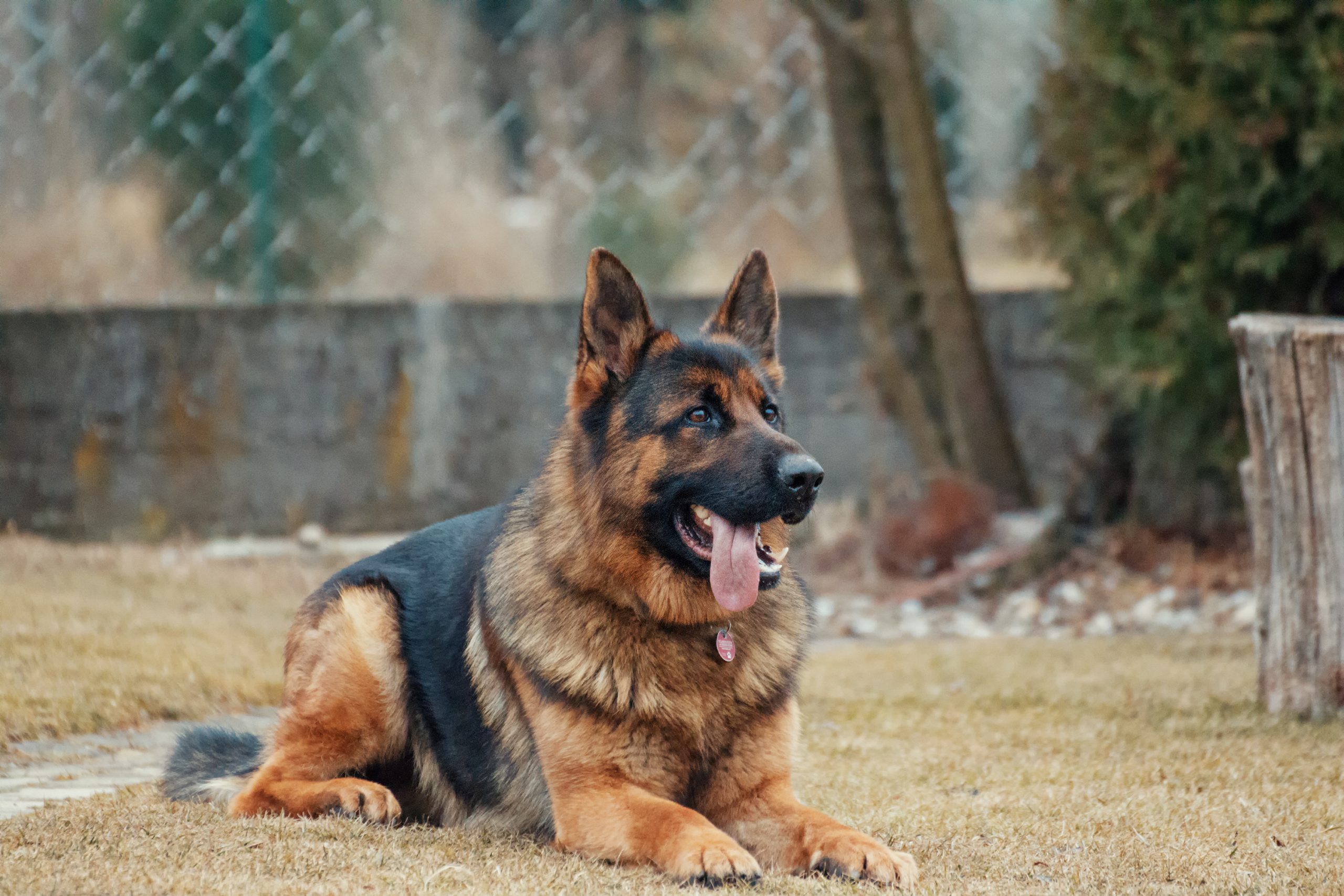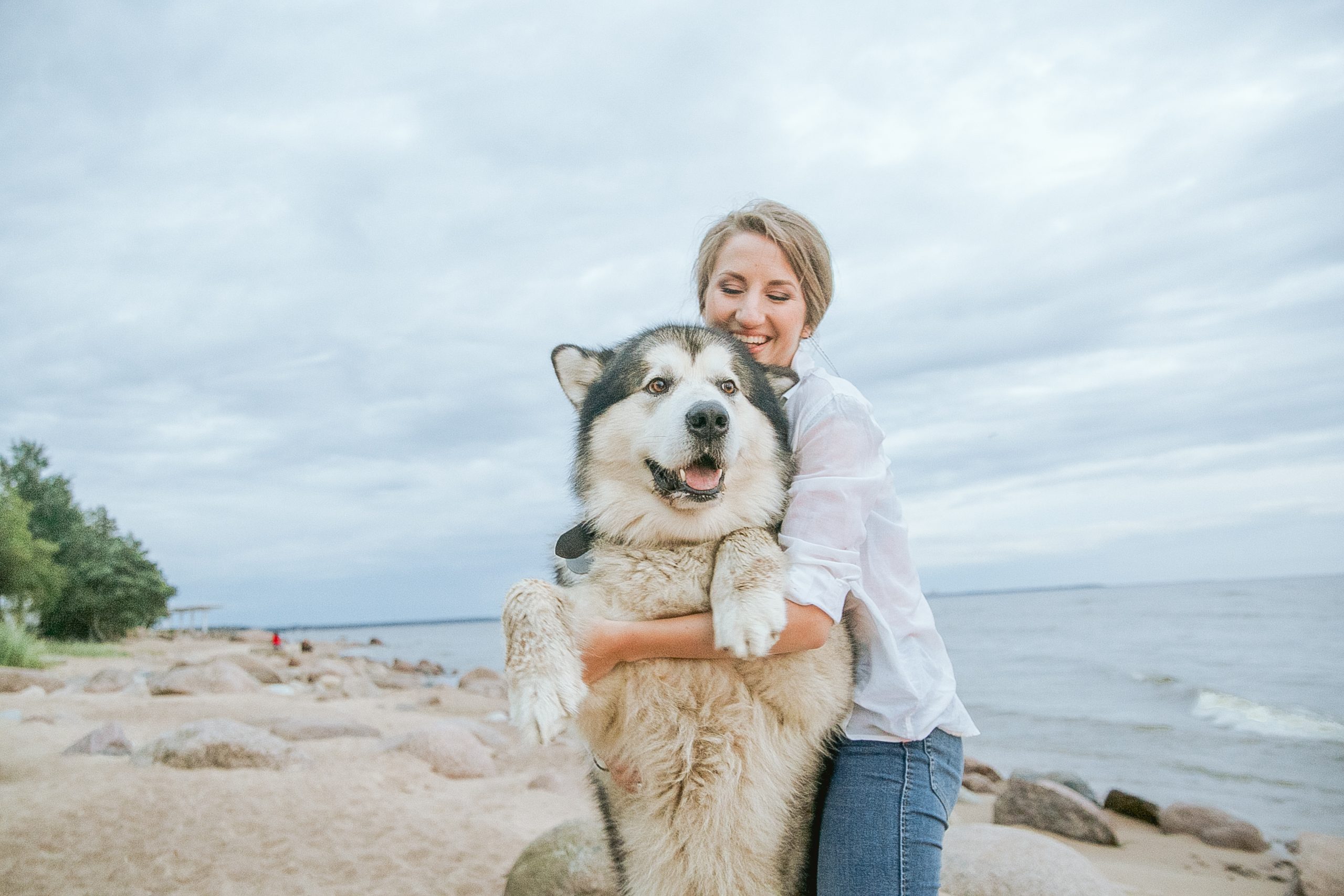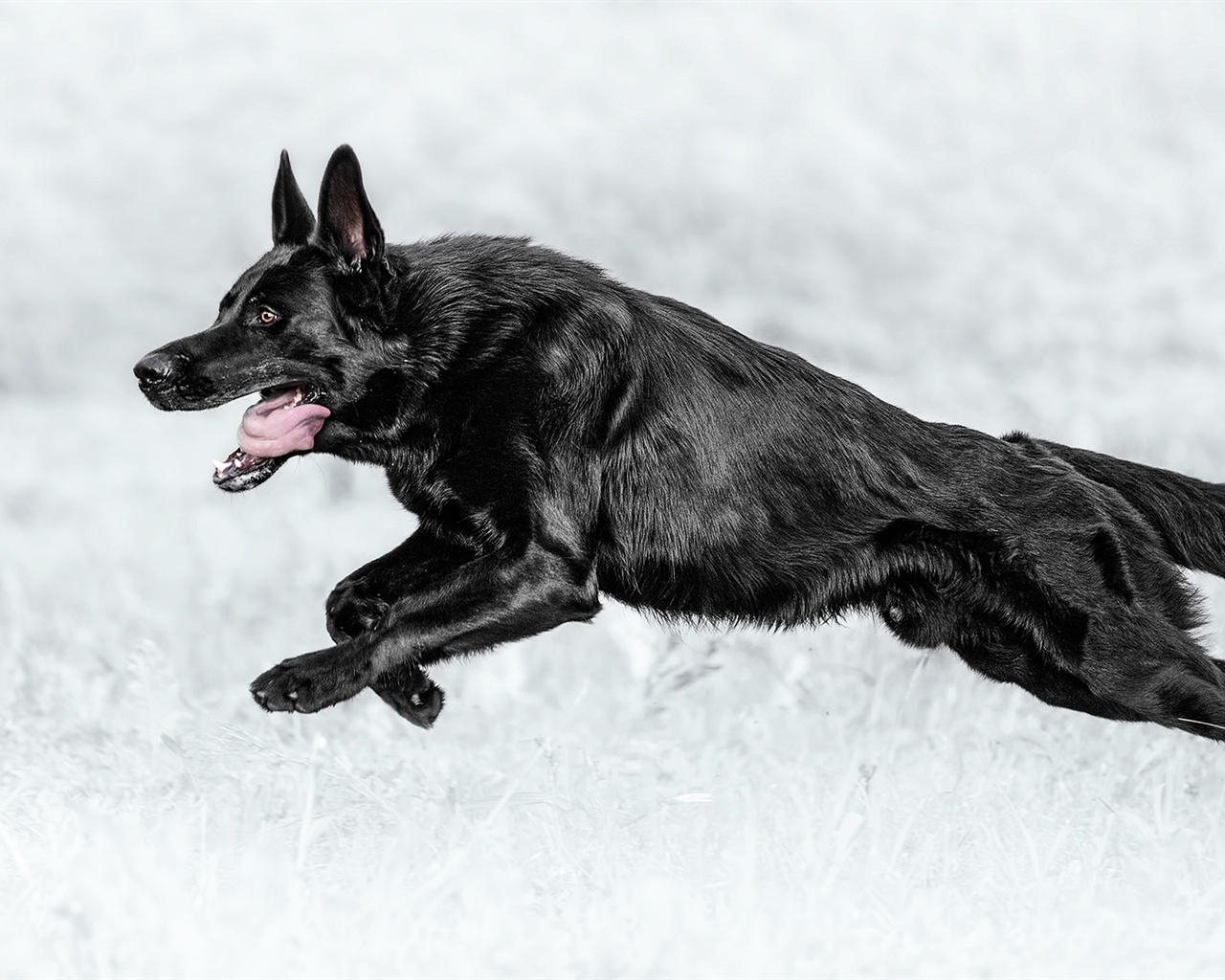The German Shepherd is a well-known and beloved breed of dog that is known for its intelligence, loyalty, and protective nature. Originally bred in Germany in the late 19th century as a herding and working dog, German Shepherds have become popular as family pets, law enforcement dogs, and service dogs. With their distinctive appearance, impressive athleticism, and versatile abilities, German Shepherds are a breed that has captured the hearts of many dog lovers around the world. In this short article, we will cover some key aspects of the German Shepherd breed, including their history, temperament, and care needs.
History of German Shepherd
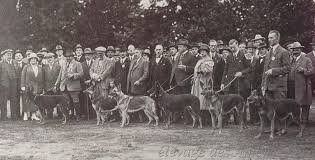
The German Shepherd, also known as the Alsatian in some parts of the world, is a breed of dog that originated in Germany in the late 19th century.
The breed was developed by a German cavalry officer named Captain Max von Stephanitz, who wanted to create a versatile working dog that could excel in a variety of tasks.
Von Stephanitz was inspired by the herding dogs of his native Germany, which he admired for their intelligence, loyalty, and trainability. He began to selectively breed these dogs to create a new breed that would combine their best traits. He aimed to create a dog that could work as a herder, a guard dog, a police dog, and a military dog.
The breed was first exhibited at a dog show in 1899, and quickly gained popularity in Germany. German Shepherds were used extensively by the German military during World War I, and their reputation for intelligence and loyalty helped them become one of the most popular breeds in the world.
During World Wars I and II, the word “German” was dropped, and the breed was referred to as the shepherd dog or the Alsatian (a name that stuck in some regions). Worldwide interest in the breed began rising in the early 1900s and the GSD was recognized by the American Kennel Club (AKC) in 1908. In modern times it remains as one of the most popular dog breeds, currently ranking second in the AKC listings. Cross-breeding these dogs with Shiloh shepherds resulted in king shepherds.
However, their association with the Nazi party during World War II led to a decline in their popularity in some parts of the world. After the war, efforts were made to rebuild the breed’s reputation, and today the German Shepherd is one of the most beloved and respected dog breeds in the world.
Appearance of the German Shepherd
The German Shepherds are a medium to large-sized dog with a muscular and sturdy build.

In terms of physical appearance, the German Shepherd has a distinct appearance with a long, wedge-shaped head, a straight, strong nose, and dark, almond-shaped eyes. Their ears are pointed and stand upright. They have a double coat of medium-length hair that can come in a variety of colors including black and tan, sable, and all-black.
German Shepherds are also known for their sloping backs and long, bushy tails. They have a confident and alert posture, and their movements are smooth and agile. Overall, the German Shepherd is a powerful and imposing dog with a strong and balanced physique.
Breed Overview
GROUP: Herding
HEIGHT: 22 to 26 inches (56 to 66 centimeters)
WEIGHT: 60 to 100 pounds (27 to 45 kilograms)
COAT AND COLOR: Coarse, medium-length double coat. Most colors are acceptable, such as bicolor, black, black and tan, black and cream, black and red, black and silver, solid black, gray, sable. Note that blue or liver is unfavorable based on the breed standard. White is not an acceptable color based on the breed standards.
LIFE EXPECTANCY: 7 to 10 years
You may want to read about Black German Shepherd Breed
German Shepherd Characteristics and Behavior
German Shepherds are a breed of dog that are highly regarded for their intelligence, loyalty, and protective instincts. Here are some of their key characteristics and behaviors:
- Intelligent: German Shepherds are highly intelligent dogs and are often used as working dogs for tasks such as search and rescue, police work, and as guide dogs for the blind.
- Loyal: German Shepherds are known for their loyalty to their owners and are protective of their family and property.
- Protective: German Shepherds have a natural instinct to protect their loved ones and can be trained to be excellent guard dogs.
- Active: German Shepherds are a high-energy breed and require regular exercise and mental stimulation to stay healthy and happy.
- Obedient: German Shepherds are known for their obedience and are highly trainable, making them great dogs for obedience competitions.
- Social: With proper socialization, German Shepherds can get along well with other dogs and pets.
- Independent: German Shepherds have a strong independent streak and can be stubborn at times.
- Affectionate: Despite their protective nature, German Shepherds can also be very affectionate and form strong bonds with their owners.
German Shepherds are a versatile and highly trainable breed that make great companions for individuals and families who are willing to provide them with the exercise, training, and attention they require.
German Shepherd Health and Care

German Shepherds are generally a healthy breed, but like all dogs, they can be prone to certain health issues. Some of the most common health concerns for German Shepherds include hip dysplasia, elbow dysplasia, bloat, and allergies.
To keep your German Shepherd healthy, it is important to provide them with regular exercise, a healthy diet, and routine veterinary care. German Shepherds are a high-energy breed and need plenty of exercise, such as daily walks or runs, to keep them in good physical condition.
Common Health Issues
Here are some of the most common health issues that German Shepherds can be prone to:
- Hip dysplasia: This is a genetic condition where the hip joint does not develop properly, causing pain and discomfort.
- Elbow dysplasia: This is a genetic condition where the elbow joint does not develop properly, causing pain and discomfort.
- Bloat: This is a serious condition where the stomach twists, cutting off blood flow and causing the dog to go into shock.
- Allergies: German Shepherds can be prone to allergies, which can cause skin irritation, itching, and ear infections.
- Degenerative Myelopathy: This is a genetic condition that affects the spinal cord, causing weakness in the hind legs.
- Pancreatitis: This is an inflammation of the pancreas that can cause vomiting, diarrhea, and abdominal pain.
- Cataracts: German Shepherds can be prone to developing cataracts, which can cause vision problems.
- EPI (Exocrine Pancreatic Insufficiency): This is a condition where the pancreas does not produce enough digestive enzymes, leading to weight loss and malnutrition.
It is important to note that not all German Shepherds will develop these health issues, but it is important to be aware of them and to seek veterinary care if any symptoms arise. Regular check-ups with a veterinarian can help identify any potential health concerns early on and can help keep your German Shepherd healthy and happy.

Grooming
Grooming is an important part of keeping your German Shepherd healthy and comfortable. Here are some grooming tips for German Shepherds:
- Brushing: German Shepherds have a double coat, which means they shed a lot. Regular brushing can help remove loose fur and prevent matting. Brushing once a week is usually sufficient, but during shedding season, brushing may need to be done more often.
- Bathing: German Shepherds only need to be bathed occasionally, usually once every three to six months. Over-bathing can strip their coat of its natural oils and cause skin irritation. Use a mild dog shampoo and rinse thoroughly to avoid leaving any soap residue.
- Nail trimming: Trim your German Shepherd’s nails every few weeks to prevent them from becoming too long and causing discomfort or even injury. If you are not comfortable doing it yourself, a groomer or veterinarian can do it for you.
- Teeth cleaning: Regular teeth cleaning is important for your German Shepherd’s dental health. Brush their teeth with a dog-specific toothbrush and toothpaste or give them dental chews to help keep their teeth clean.
- Ear cleaning: German Shepherds have floppy ears that can trap moisture, leading to ear infections. Clean their ears regularly with a gentle ear cleaner to prevent infections.
- Eye cleaning: Keep your German Shepherd’s eyes clean by wiping them gently with a damp cloth. Check for any signs of redness or discharge, which could indicate an eye infection.
By following these grooming tips, you can help keep your German Shepherd healthy and comfortable. It is also a great opportunity to bond with your dog and show them some love and attention.
Nutrition
Nutrition is important for keeping your German Shepherd healthy and happy. Here are some nutrition tips for German Shepherds:
- Choose high-quality dog food: Look for dog food that contains high-quality protein sources, such as chicken, lamb, or fish. Avoid dog food that contains fillers, such as corn or wheat, as they provide little nutritional value.
- Consider their age: German Shepherd puppies have different nutritional needs than adult dogs. Look for puppy food that is specifically formulated for large breed puppies, which will have the appropriate balance of nutrients for their growing bodies.
- Monitor portion sizes: German Shepherds are prone to obesity, so it is important to monitor their portion sizes and not overfeed them. Follow the recommended serving size on the dog food package and adjust as necessary based on your dog’s individual needs.
- Provide plenty of fresh water: Make sure your German Shepherd has access to plenty of fresh, clean water at all times. This is especially important during hot weather or after exercise.
- Consider supplements: If your German Shepherd has joint issues or skin allergies, supplements such as glucosamine/chondroitin or fish oil can help improve their condition.
- Avoid table scraps: Feeding your German Shepherd table scraps can lead to weight gain and digestive problems. Stick to feeding them high-quality dog food and healthy treats.
- Be mindful of allergies: German Shepherds can be prone to food allergies, so if you notice any signs of skin irritation, itching, or gastrointestinal upset, talk to your veterinarian about the possibility of a food allergy and switch to a different food.
By following these nutrition tips, you can help keep your German Shepherd healthy and well-fed. Always consult with your veterinarian for specific dietary recommendations based on your dog’s individual needs.
Is German Shepherd a good family dog?
Yes, German Shepherds can make excellent family dogs when they are properly trained and socialized. They are known for their loyalty and protective instincts, which can make them excellent watchdogs for the family. Additionally, they are highly trainable and intelligent, which means they can be taught to behave well around children and other pets.
It is important to note, however, that German Shepherds are a high-energy breed and require regular exercise and mental stimulation to stay healthy and happy. They also have a strong prey drive, which means they may chase and potentially harm smaller pets, so early socialization and training is important to ensure they behave appropriately around other animals.
Overall, German Shepherds can make great family dogs for active households with experienced owners who are willing to provide them with the exercise, training, and attention they need.
bottom line
German Shepherds are a remarkable breed of dog that are beloved by many for their intelligence, loyalty, and protective nature. Originally bred for herding and working, they have become popular as family pets, law enforcement dogs, and service dogs. German Shepherds are known for their distinctive appearance, impressive athleticism, and versatile abilities. However, they also have specific care needs, including regular exercise, grooming, and nutrition. With proper care, German Shepherds can be wonderful companions and valued members of any family.
How to take care of your German shepherd?

German shepherds have coarse, sometimes wiry, medium length hair with thick undercoats. Their coats should be brushed every few days. German shepherds have a relatively high shedding rate which can be lessened by routine grooming. Be prepared to have hairs on your clothing and furniture and you’ll need to vacuum frequently. Luckily, the coat also resists dirt and debris and you won’t need to bathe your dog more than once a month. In fact, too-frequent bathing will strip out the oils that keep it healthy.
Common German shepherd Health Problems

Responsible breeders strive to maintain the highest breed standards as established by kennel clubs like the AKC. Dogs bred by these standards are less likely to inherit health conditions. However, some hereditary health problems can occur in the breed. The following are some conditions to be aware of:
- Hip dysplasia
- Elbow dysplasia
- Elbow hygroma
- Gastric dilatation-volvulus
- Degenerative myelopathy
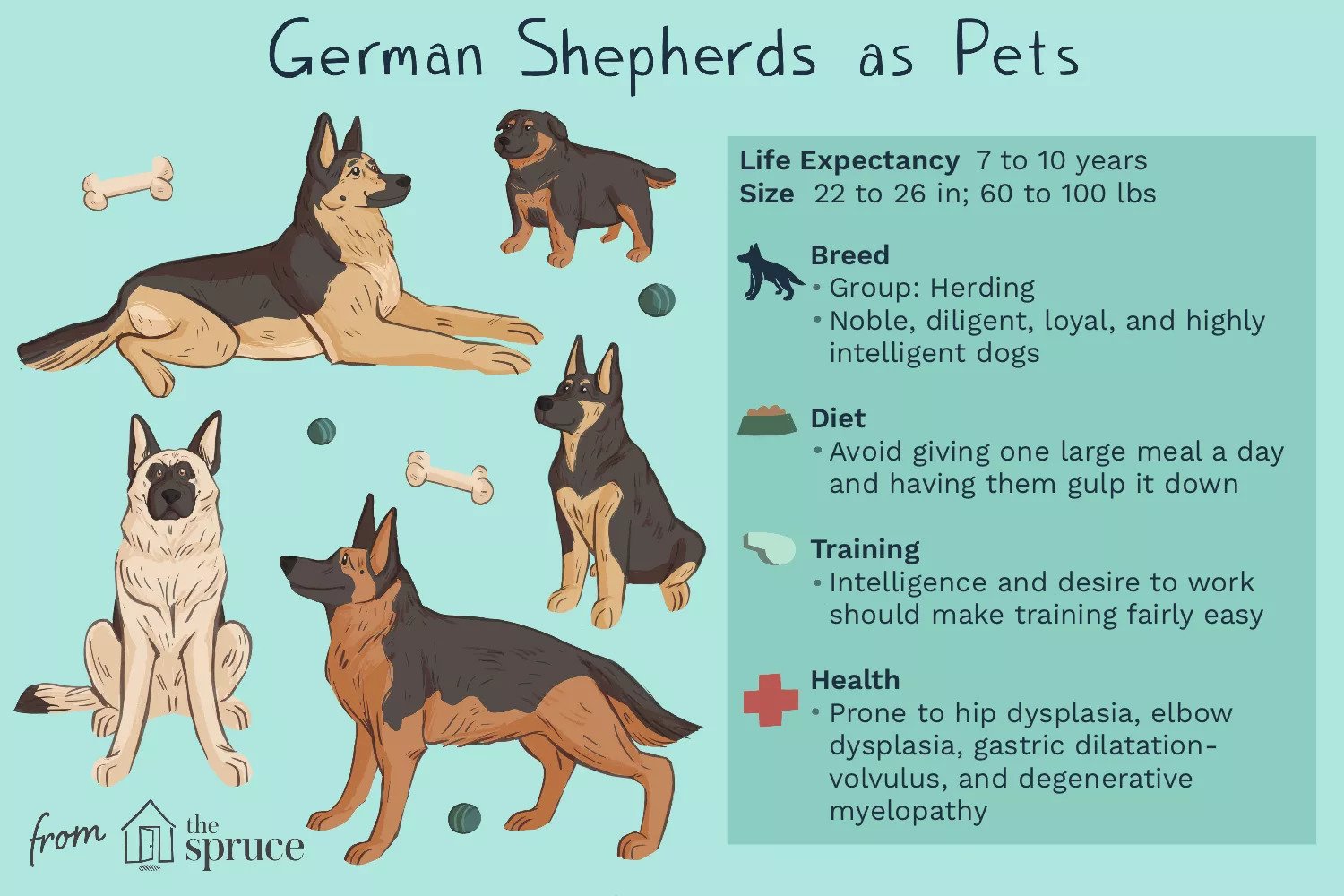
Diet and Nutrition
Your German shepherd will need two meals a day of up to two cups of dry dog food, but this will depend on the dog’s size, activity level, age, and other factors. As they are prone to bloating and possible stomach torsion, you want to avoid giving one large meal a day and having the dog gulp it down. Be sure your dog has access to clean, freshwater.
Where to Adopt a German Shepherd
If you think you’d like to adopt a German shepherd in America, you can start by contacting one of the following organizations:


